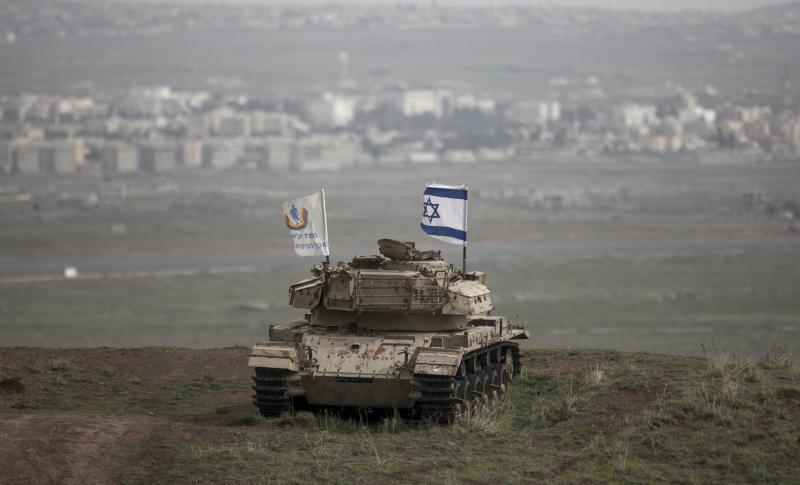Israel says US not in Syria game as Russia seen dominant
Sign up now: Get ST's newsletters delivered to your inbox

An Israeli flag is raised on an old Israeli tank, leftover from the 1973 Israeli-Syrian war, near Quneitra, Syria, on Feb 11, 2018.
PHOTO: EPA-EFE
Follow topic:
TEL AVIV (BLOOMBERG) - Israel is counting on Russian President Vladimir Putin to keep confrontations with Iran and Syria from spiralling into war as the Trump administration mostly watches from the sidelines, a senior aide to Prime Minister Benjamin Netanyahu said on Sunday (Feb 11).
"The American part of the equation is to back us up," but the US currently "has almost no leverage on the ground", Mr Michael Oren, Mr Netanyahu's deputy minister for public diplomacy and a former ambassador to Washington, said in a phone interview. "America did not ante up in Syria. It's not in the game."
Mr Oren's criticism reflects Israel's view that Washington isn't doing enough to curb Iran's military ambitions in southern Syria, which borders the Israeli-held Golan Heights, as seven years of fighting winds down and actors consolidate gains.
In the worst military confrontation in the border region since the 2006 Lebanon war, the Israeli air force struck 12 targets on Saturday in Syria, including four belonging to Iran, after it said an Iranian drone penetrated Israeli airspace.
A Syrian missile brought down an Israeli combat plane, the first lost to enemy fire since Israel's first war in Lebanon in 1982.
Mr Netanyahu was in direct contact with the Russians - the dominant player in Syria - after the confrontation.
"We believe Russia wants to stabilise its achievements in Syria and that it understands that Iranian military presence and activity there is a source of tension and friction," said Mr Chagai Tzuriel, director-general of Israel's Intelligence Ministry.
American involvement is crucial to preventing a full-scale war, he said, adding that "Syria is the key arena, and what happens in Syria influences the whole region and beyond".
Investors in Israel have grown accustomed to geopolitical shocks but Saturday's showdown reverberated through the market. The TA-35 stock index fell on Sunday to its lowest level in two months before rebounding on Monday.
Relying on Russia may be Israel's best bet, but it's not a sure one. Over the past few years Mr Netanyahu has made a number of visits to Russia to lay out Israel's red lines and ask Mr Putin to rein in Iran.
Russian news media have cited Foreign Minister Sergei Lavrov as saying that Iran's presence in the country is legitimate, and Moscow hasn't promised to guarantee that pro-Iranian forces will leave southern Syria.
Asked if the Russians can keep Iran and Syria at bay, Mr Oren replied, "We assume that they have that ability. We'll see."
Israeli commentators noted that a Russian statement on Saturday's clashes implicitly criticised Israel for violating Syrian sovereignty, but didn't criticise the drone infiltration into Israel that prompted the attack.
On Sunday - more than 24 hours after the confrontation - the White House issued a statement backing Israel's "right to defend itself from the Iranian-backed Syrian and militia forces in southern Syria" and calling on Iran and its allies to "cease provocative actions".
Mr Netanyahu also conferred with US Secretary of State Rex Tillerson.
Israel's absence from Mr Tillerson's current Middle East tour has raised questions about how much Israel can depend on the White House, even though US Vice President Mike Pence visited Israel last month.
"I think a visit to Israel by Secretary Tillerson this week, followed by strong US-Israeli coordinated messaging to Russia and the EU" could allay concerns about US indifference on Syria, tweeted Mr Dan Shapiro, who served as US ambassador to Israel under President Barack Obama.
Failing to stop in Israel after Saturday's clashes would be "malpractice" by Mr Tillerson, Mr Shapiro said.
White House National Security Council Spokesman Michael Anton said Israel should have no doubts about the US stance.
"We support Israel's security, and the idea that we are 'on the sidelines' when its security is threatened is very far from the case," Mr Anton said. "We have a very close relationship with our Israeli national security counterparts at all levels."
Russia entered the Syrian war to prop up its client, President Bashar al-Assad. Iran and Hizbollah also support Mr Assad, and see the vacuum in Syria as a chance to build a sphere of influence stretching from Teheran to the Mediterranean Sea.
The US says it opposes Mr Assad, but has limited its role in Syria to helping fight Islamic State in Iraq and Syria (ISIS).
Russia's interest "is to reach a political and military solution in Syria and to rebuild it", Mr Amos Yadlin, a former chief of Israeli military intelligence, told reporters in a conference call on Saturday. "A conflict in the north between Israel, Hizbollah and Iran is not in their interest."
Mr Yadlin, now head of Tel Aviv University's Institute for National Security Studies, doesn't expect Israel's salvation in Syria to come from the US.
"America is busy with other things," he said.

